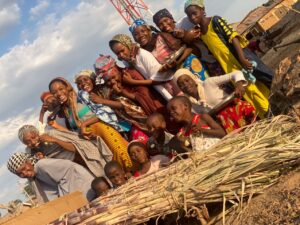Understanding Qauyawa (Villagers) Day: An emerging trend in Hausa marriage ceremonies, by Hauwa Mohammed Sani (1)
Culture provides the basic form of the many ceremonies and rituals of social life such as marriage, funerals, naming, etc. Marriage is practiced around the world but the way it is celebrated varies immensely across cultures.
There is no doubt that our indigenous culture is fast being eroded by modern trends. It is observed that external factors such as western education, modernisation, and religion have exerted tremendous influence on the various cultural genres of the Hausa culture, marriage ceremonies inclusive.
However, the writer argues that the degree of such influence on the Hausa cultural aesthetic, particularly wedding ceremonies, is relative, dependent on their level of adaptability and acceptability. Also, my overarching argument is that, as the older indigenous tradition like wankan amarya (the bridal bath) which entails sprinkling water on the bride while she sits on Turmi (a mortar) in the morning to the one where people dance, sing, and have fun in the evenings, are slipping away from the Hausa marriage rites, the new trends are gradually creeping in. One of such new trends is Qauyawa (villagers’) day.

Wedding ceremonies in Hausa communities have taken on innovative dimensions; Qauyawa day is one of such innovations. Qauyawa day, meaning villagers’ day, which is a blend of Hausa and English, is hinged upon the belief by the Hausa people that everyone originated from the village; even people who live in the urban areas have their roots in the village. During the ritual, the modern youth partake in mimicking and emulating the villagers through their costumes, make-up, food, behaviours, etc.

This is one of the innovations and trends that have become popular in Hausa marriage ceremonies. It is a traditional or cultural event done to represent the lifestyle of villagers and their culture. On this day, people enjoy themselves and have fun to the fullest just like many other events. They eat traditional foods and fruits like goruba, (Doulm palm), aduwa (soap berry), magarya (Ziziphus Mauritiana), goro (kolanut), dambu (grits from whole grain), sugarcane, and more.
Traditional music is also played and drumming and cultural plays are presented all throughout the event. All these have significance within the context of the event and symbolic meanings.
The main value of Qauyawa day
It is literary called Qauyawa day, a compound word with a blend of Hausa and English. “Qauyawa” means rural people and “Day” is an English word that means any period of twenty-four hours. Qauyawa day might be considered as the amalgamation of modernisation and ruralisation, or ruralisation in the urban area. It might also be considered the nexus between the past and the present. Or a reconciliation between the past and the present within the context of the Hausa marriage ritual. The main values of Qauyawa day are these;
1 Tuna Asali /Remembering the root/ Cultural revival: This is based on the belief that everybody has a root in the village; that everyone originated from the village. Qauyawa day is performed on this basic assumption.
2 Tuna Baya /Remembering the past: Those engaged in the ritual believe that some of the attitudes and dressing modes demonstrated during the events are actually ways of supplanting the present modes of dressing with the older/ rural versions.
3 Nishadi/ Entertainment: It is obvious that Qauyawa day serves as a method of amusement and entertainment when one considers all the drumming, singing, dancing, and eating jovialities that are enclosed in the event. It is also performed to meet the sociocultural need of society through entertainment.
4 Zumunci / Bond of relationship: It is believed that on this day all the kinships of the bride get together to participate in the ceremony, therefore, it helps in tying the bond of kinship and relationship of that particular family and even between the bride and the groom’s family.
5 Ala’ da/ Tradition: Qauyawa day is considered a demonstration of both older and contemporary culture as exhibited by the mode of dressing and make-up. The older mode of dressing and the new mode of Henna design. A blend of both old and contemporary culture.
6 Ilmantarwa cikin nishadi /Edutainment: Edutainment is a blend of education and entertainment, two important features of every human society. It talks about a process of purposefully designing and implementing a message or activity to both entertain and educate in order to increase audience members’ knowledge about an issue, create favourable attitudes and build social norms and behaviour of individual norms or communities. Qauyawa day falls into this category because it both entertains and educates particularly about the medicinal nature of some of the foods used during the ceremony as will be discussed below.
7 buki /celebration: Qauyawa day is actually done before the actual wedding day. It is normally performed a day or two days before the wedding fatiha. So, it is listed as one of the pre-wedding ceremonies.
8 kwaikwayo/Imitation: One of the basic tenets of Qauyawa day is imitation. Most of the activities involved are imitations; they are not the real behaviours of the celebrants, the dressings, the makeup, the behaviours, etc are all imitations performed solely for that event.
Dr Hauwa Mohammed Sani is from the Department of English and Literary Studies, Ahmadu Bello University, Zaria, and can be reached via Email: hmsani@abu.edu.ng or hauwamohammedsanim@gmail.com.
Follow the Neptune Prime channel on WhatsApp: https://whatsapp.com/channel/0029Va74ZvU2v1IqKByXoX3d
Do you have breaking news, interview request, opinion, suggestion, or want your event covered? Email us at neptuneprime2233@gmail.com


